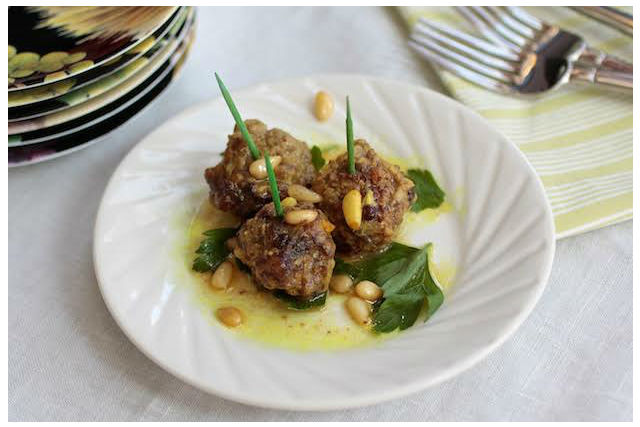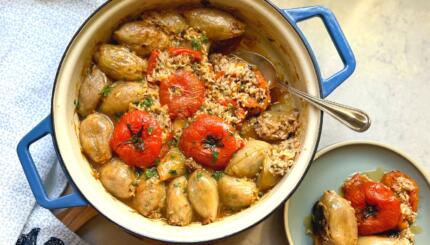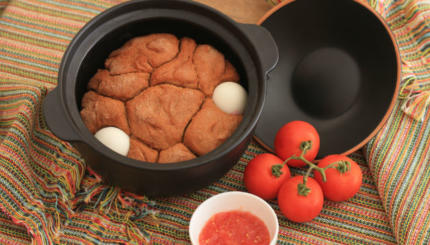Albondigas, or meatballs, are a mainstay of Sephardic cuisine. They come in sizes ranging from golf balls to cherries and may be rolled into round or flattened shapes. Chopped onions, garlic, roasted eggplant, fresh spinach, chopped leek and grated carrots have been mixed into meatballs for centuries. These ingredients served to season meat (or poultry) which was then fried or simmered in sauce. Moistened bread bound it all together and served as another way to make these delicious treats an economical choice.
When I learned that the southern Italians sometimes included currants and pignoli nuts in their meatballs, I was intrigued. Perhaps it’s my Galiciana roots but I liked the prospect of adding a little sweetness (and unexpected texture) to the meat mix. It seemed like a good jumping point for considering how to use honey in my meatballs for Rosh Hashanah.
My intention was to get this mix subtly sweet, with a nod to the symbolism of serving sweet foods to ensure a sweet New Year. I paired citrus with the fruity nectar to balance the sweetness and sparked the flavors with cracked pepper, cumin and turmeric. Tiny, moist currants and rich pignoli provide an unfamiliar twist. For guests who think that meatballs belong in tomato sauce, they will be surprised and delighted by the yin/yang of this mildly sweet and lemony simmer broth.
Because these meatballs are quite small they are a bit of work. Set aside a couple of hours in order to get the task done. It will be time well spent. And you can check another dish off your ‘to do” list by making them in advance and freezing them.
The Nosher celebrates the traditions and recipes that have brought Jews together for centuries. Donate today to keep The Nosher's stories and recipes accessible to all.
Love Jewish food? Sign up for our weekly Nosher recipe newsletter!
Ingredients
For the meatballs:
2 pounds lean ground beef
1 medium onion, grated
2 eggs, beaten
3-4 cloves garlic, minced
1 cup plain breadcrumbs
3 Tbsp fresh parsley, chopped
3 Tbsp fresh mint leaves, chopped
1 tsp cumin
1 tsp. turmeric
salt and pepper to taste
½ cup currants
½ cup pignoli (pine nuts)
½ cup canola oil for frying
For the sauce:
2 cups water
2 Tbsp olive oil
2 Tbsp honey
2 Tbsp freshly squeezed lemon juice
½ tsp cumin
½ tsp turmeric
salt and pepper to taste
Directions
In a large bowl, combine all ingredients through turmeric. Mix gently with hands. Do not overmix.
Add currants and pignoli to meat mixture and combine.
Shape mixture into 1-1 ½” meatballs, wetting hands with water periodically to prevent the meat from sticking to fingers. Place meatballs on a couple of foil lined trays so they are all ready to fry at the same time.
Divide ½ cup of canola oil into 2 frying pans and heat on medium.
Add meatballs in a single layer until both pans are full but not crowded. Brown meatballs, turning them by using 2 spoons. They should be golden.
With a slotted spoon, remove meatballs when golden on all sides. Place meatballs on plates lined with paper towels so they may drain. Repeat until all meatballs are browned. You may want to save the browned pignoli and sprinkle them on meatballs when serving them.
Combine all ingredients for sauce and bring to low simmer. Taste to adjust for sweetness and salt.
Place all meatballs in sauce (It’s ok if they are not all submerged). Simmer gently for 30 minutes.
Remove meatballs from sauce, plate and serve with toothpicks. Sprinkle with browned pignoli and chopped fresh mint or parsley leaves. Drizzle sauce over the meatballs if you like.
Love Jewish food? Sign up for our weekly Nosher recipe newsletter!



